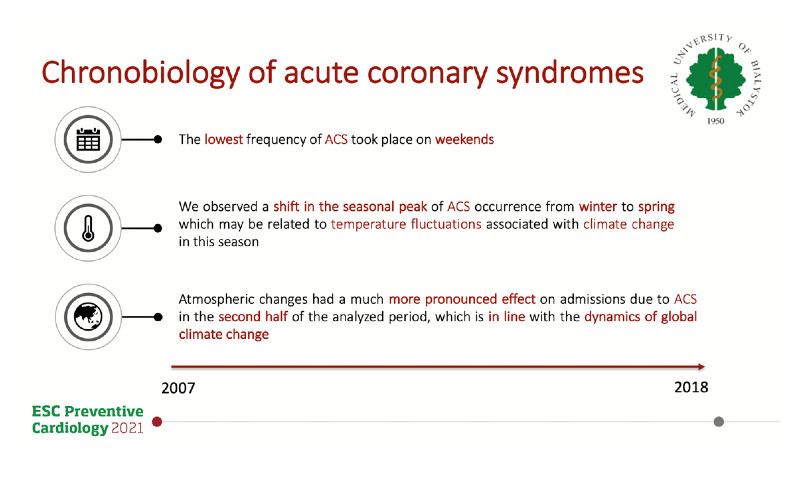A team of researchers from the Department of Invasive Cardiology and the Student Scientific Society affiliated with the clinic published the results of their paper on the chronobiology of acute coronary syndromes (ACS) in the Archives of Medical Science. They analyzed the incidence of myocardial infarction from 2008 to 2017, with a total study of nearly 20 million patient-years.
 Chronobiology is a branch of science that examines how natural rhythms, such as seasonal and weekly rhythms, affect living organisms. It has been shown that the previously prevailing trend of a peak in the incidence of ACS, during periods of reduced temperature, has changed. There has been a shift in the seasonal increase in the incidence of ACS from winter to spring. This is directly related to climate change, which causes an increase in adverse weather events. Currently, according to the authors, it is not extreme cold and high temperatures, but short-term weather fluctuations that have a dominant effect on the chronobiology of acute coronary syndromes. The researchers found that each 10ºC increase in daily temperature fluctuations was associated with a 13 percent increase in hospital admissions for ACS. This effect was most strongly observed in the spring, a season originally associated with large temperature fluctuations that are greatly exacerbated by climate change. These atmospheric changes had a much more pronounced effect on admissions due to ACS in the second half of the analyzed period, which is in line with the dynamics of global climate change.
Chronobiology is a branch of science that examines how natural rhythms, such as seasonal and weekly rhythms, affect living organisms. It has been shown that the previously prevailing trend of a peak in the incidence of ACS, during periods of reduced temperature, has changed. There has been a shift in the seasonal increase in the incidence of ACS from winter to spring. This is directly related to climate change, which causes an increase in adverse weather events. Currently, according to the authors, it is not extreme cold and high temperatures, but short-term weather fluctuations that have a dominant effect on the chronobiology of acute coronary syndromes. The researchers found that each 10ºC increase in daily temperature fluctuations was associated with a 13 percent increase in hospital admissions for ACS. This effect was most strongly observed in the spring, a season originally associated with large temperature fluctuations that are greatly exacerbated by climate change. These atmospheric changes had a much more pronounced effect on admissions due to ACS in the second half of the analyzed period, which is in line with the dynamics of global climate change.
In addition to the seasonal shift, a change in weekly rhythm has also been observed. Until now, most studies have identified Monday as the day with the highest incidence of ACS. This was linked to the stress of returning to work after a weekend break. In contrast, the researchers' analysis showed that the peak occurred on Thursday, which may be related to the fact that more people now are not limited to the rigid framework of a working week. There was also an observable weekend decrease in the incidence of heart attacks linked to a reduced number of external stressors triggering the disease.
Both climate change and changes in the nature of the work make ongoing research in chronobiology necessary. By knowing and understanding the rhythms of ACS occurrence, we can better predict and improve primary prevention of cardiovascular disease.
The paper was acknowledged at the ESC 2021 congress, where the presenter Anna Kurasz received the first prize for an original paper.
Link to publication: https://www.archivesofmedicalscience.com/Does-climate-change-affect-the-chronobiological-trends-nin-the-occurrence-of-acute,124020,0,2.html



